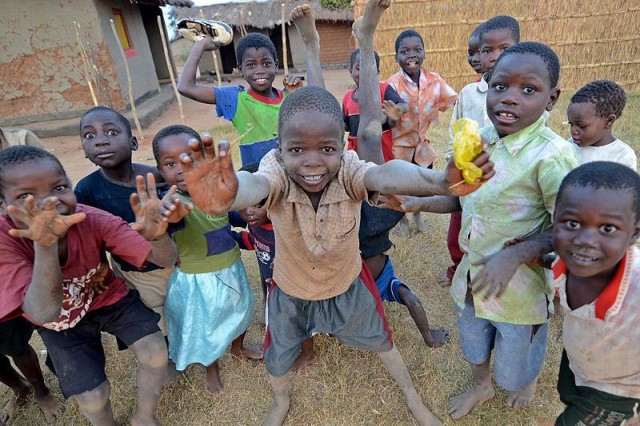Childhood and Adolescence
For most Africans in the past, growing up meant helping the family produce food, learning the community's values, and gradually taking on new tasks, privileges, and responsibilities. After about 1900, however, patterns of childhood education and socialization began to change. Three major influences for change have been Western-style schooling, religious schooling in the Islamic nations of northern Africa, and the growth of cities. Yet many aspects of childhood and adolescence continue to reflect distinctly African values and cultures.
Children's Lives
African children are considered to be infants while they breast-feed, typically from 12 to 24 months. Infants sleep next to their mothers at night, and during the day they are the main focus of the mothers' parenting activities. Mothers quiet their crying babies quickly, and infants generally do not develop the habit of crying loudly to express emotions. Mothers also use warnings and commands to keep their infants safe and to teach them to respect authority—an important lesson in most rural African communities. On the whole, male and female infants are treated fairly equally.
When mothers work away from the home, infants are usually tended by other women, such as sisters, grandmothers, or other mothers within the extended family. An older sister—perhaps as young as five years old—may become responsible for carrying an infant on her back. In some eastern African cultures, a woman who carries her younger brother on her back has an especially close relationship with him when they are adults.

Once out of infancy, young children are expected to join their brothers and sisters and other related children in the home and eventually the neighborhood. They begin learning about their roles and responsibilities. Children as young as two to four years old may help adults with household tasks or with livestock herding. Older children care for younger siblings during the day, supervising their learning and work. During these early years, African children rapidly acquire knowledge about the societies and environments in which they live. They learn the customs that govern speech, behavior, and facial expressions; the relationships among men, women, and children; and the routines of work, play, and ceremonies.
During middle childhood, African children are given increased responsibility. Between the ages of five and seven, many urban children enter school. In rural areas, children of this age may take on new tasks such as carrying pots of water or watching infants. By the age of ten, African children are contributing significantly to their families' economic life. They help with farming or herding, or they perform household chores so that the adults can work. Children who are good workers are considered to show maturity and the prized values of respect and obedience.
Between 5 and 12 years of age, some African children are sent by their families to live with relatives who are wealthier or more privileged. In exchange for working for the relatives, the children are expected to receive opportunities not available at home. A rural family, for example, may send a child to live with and work for an uncle in the city, hoping that the uncle will pay for better schooling than the child could receive in the village. Sometimes such arrangements benefit both sides, but in other cases they take advantage of young children. As more Africans move to the cities and divisions between poor and well-off family members grow wider, the temptation to exploit children's labor increases.
From 12 to 20
Africans experience adolescence differently than teenagers in Western countries. In the West, adolescence leads to sexual and social maturity and to making choices about work—all at about the same time. The teen years are seen as a movement toward eventual individuality and independence. In Africa, however, young people are not automatically considered independent adults when they reach their twenties. Even young people who have arrived at sexual maturity and engaged in courtship may not be considered adults. To Africans, adolescence is not a preparation for independent life but a furthering of the childhood process of fitting into family and community structures.
For African teens, personal choice may be limited. Young men and women are expected to mirror the roles and activities of their fathers and mothers or to accept the choices made for them by their families. A girl's father, for example, may arrange her marriage to a rich man she has never met. In addition, African men and women usually marry at very different ages. It is common in most African cultures for girls to marry in their middle teen years, while men marry later and at a much larger range of ages. That range often spans from age eighteen to age thirty. African adolescents do not expect to live on their own in the near future. Even when they are married and raising their own children, young men and women often belong to the household of the husband's parents or other senior relatives. However, as more and more young Africans live in cities, attend school, and choose their own occupations, their experience of adolescence is coming closer to that of Western teenagers.
Many African adolescents are affected by rituals and customs inherited from the past. In some groups, INITIATION RITES have traditionally marked the passage out of childhood for both boys and girls. Such ceremonies in eastern Africa have involved surgery on the young person's sexual organs. In western Africa, boys and girls have been brought into separate SECRET SOCIETIES, living in the forest apart from their families during their initiations. Although some of these practices are changing in modern Africa, they are still woven into the fabric of community life in many places. (See also Age and Aging, Education, Family, Gender Roles and Sexuality, Kinship, Marriage Systems.)